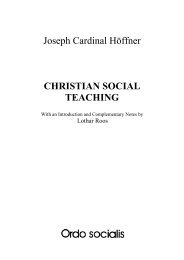Prof. Franz Josef Stegmann Bethlehem Social ... - Ordo Socialis
Prof. Franz Josef Stegmann Bethlehem Social ... - Ordo Socialis
Prof. Franz Josef Stegmann Bethlehem Social ... - Ordo Socialis
You also want an ePaper? Increase the reach of your titles
YUMPU automatically turns print PDFs into web optimized ePapers that Google loves.
<strong>Stegmann</strong><br />
advertising, but this is a misuse; the true role of advertising is information. It is therefore<br />
useful, even necessary, the advocates of the <strong>Social</strong> Market Economy say, that independent test<br />
institutes give as much objective information to the public as possible.<br />
Sometimes the improvement of efficiency and productivity is criticised as being materialistic.<br />
However, according to the famous scholar of social history and economist Alexander Rüstow,<br />
as long as "all human beings do not enjoy at least the subsistence level, the improvement of<br />
productivity is a more than economic demand, it is a social demand, a moral demand". 41<br />
Greater economic efficiency, finally, increases the capability of the state to correct socially<br />
negative results of the market process and to make tolerable necessary changes to the economic<br />
structure; ie, it helps those unable to help themselves, for example the sick, old and<br />
handicapped. Economic efficiency is the condition for social efficiency. Economic<br />
downswing results in social downswing, in cutting hack on the welfare state. Economic<br />
efficiency is not everything, but without economic efficiency everything becomes nothing.<br />
To sum up: the goal of <strong>Social</strong> Market Economy is, according to neoliberal thought, to combine<br />
the free initiative of individuals in the marketplace with a social welfare development<br />
that is based and safeguarded by market economy achievements. According to the programme<br />
of the Christian Democratic Union before the first national election in 1949, two economic<br />
systems were to be rejected:<br />
• The so-called "free economy of 'liberalist’ character". This is the free or pure market<br />
economy of earlier centuries known as capitalism and existing in parts of the world up to<br />
110W, in which the weak and poor are exploited by the mighty.<br />
• The "socialist system of a centrally planned and controlled economy" which is not able to<br />
manage the problem of both "efficient production" and "just distribution of the products".<br />
42<br />
The former prime minister of Bavaria and Chairman of the Christian <strong>Social</strong> Union, Hanns<br />
Seidel, expressed this understanding of <strong>Social</strong> Market Economy as early as 1947, stating that<br />
we need "an effective and sound market economy" as well as "social safeguards" which<br />
ensure that the market economy "does not degenerate into a mere profit economy". 43<br />
2. NEOLIBERAL REFORMS COMPARED WITH CLASSICAL ECONOMIC<br />
LIBERALISM/CAPITALISM<br />
2.1 Neoliberalism - what is it?<br />
I have repeatedly mentioned "neoliberal" and "neoliberalism". What do these terms mean and<br />
how are they to be understood? It seems to me that in many countries throughout the world,<br />
"neoliberal" and "neoliberalism" are very close, or even identical, to capitalistic" and "capitalism".<br />
Examples of this are the economic policies of Ronald Reagan and Margret Thatcher, or<br />
the economic theories held by the wellknown economists Milton Friedman/Chicago and<br />
Friedrich August von Hayeck, who received the 1974 Nobel Prize for economics. Von Hayek,<br />
who lectured in economics in the United States for many years, considered the concept of<br />
41 Alexander Rüstow, Wirtschaft als Dienerin der Menschlichkeit. in: Was wichtiger ist als Wirt‐schaft' Vorträge<br />
auf der fünfzehnten Tagung der Aktionsgemeinschaft Soziale Marktwirtschaft am 29. Juni 1960. Ludwigsburg<br />
1960, 7‐16, 10.<br />
42 Düsseldorfer Leitsätze der Christlich Demokratischen Union vorn 15. Juli 1949, in: Ossip K. Flechtheim (Ed.),<br />
Dokumente zur parteipolitischen Entwicklung in Deutschland seit 1945, Vol. 2, Berlin 1963, 58‐76 60 f.<br />
43 Hans Ferdinand Groß, Hanns Seidel 1901‐1961, Eine politische Biographie, München 1992, 70.<br />
22















